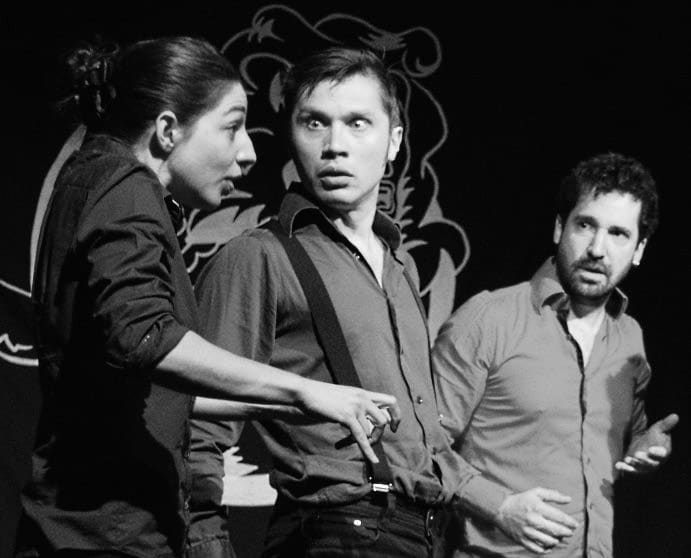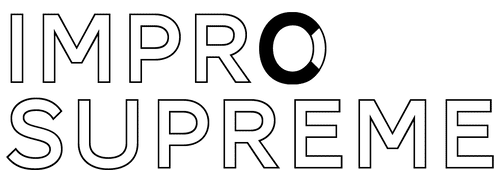What the audience sees and hears is just the surface of what’s happening in a scene.
Underneath bubbles the secret life of the improvisers.
Here’s a dictionary of improv emotions to help you understand what’s going on!
A SHORT dictionary of
Improv Emotions
The first twenty-three improv emotions listed here are paraphrasing entries in John Koenig’s Dictionary of Obscure Sorrows. The rest are of my own invention.
1
Sonder
The realisation that each stage partner has ideas that are as interesting and original as your own.
2
Opia
The ambiguous intensity of holding eye contact with a stage partner feeling simultaneously high- and low-status.
3
Monachopsis
The subtle but persistent feeling of being in the wrong scene or show, secretly blamed on your stage partners.
4
Énouement
The bittersweetness of hovering above the scene you are in and seeing how things will turn out but not being able to tell your present self.
5
Vellichor
The strange wistfulness of hearing an audience suggestion you have already used many times before.
6
Rubatosis
The unsettling awareness of the power of your own creative imagination.
7
Kenopsia
The eerie, forlorn atmosphere of a rehearsal studio usually bustling with laughter but is now abandoned and quiet.
8
Mauerbauertraurigkeit
The inexplicable urge to refuse perfectly valid offers, even ideas you think are great.
9
Jouska
The compulsion to play out certain hypothetical narrative developments in your head during an improvisation.
10
Chrysalism
The enveloped tranquillity of being offstage during a scene that is failing miserably.
11
Vemödalen
The frustration of creating excellent space objects while knowing thousands of mime artists could still do it better.
12
Anecdoche
The vacuous feeling you get from a scene in which everyone is talking, but nobody is listening.
13
Ellipsism
A sadness that you will never know how your improv format will turn out in the future when performed by unknown strangers.
14
Kuebiko
A state of exhaustion inspired by silly jokes and cheap gags.
15
Lacheism
The perverse desire to go completely blank in the middle of a scene and experience the disaster of not knowing what to say or do.
16
Exulansis
The tendency to give up your own ideas because your stage partners are unable to relate to them.
17
Adronitis
Frustration with the time it takes to establish the relationship between the characters in a scene.
18
Rückkehrunruhe
The feeling after an intensive improv workshop when you find that nothing remains except a group picture on Facebook.
19
Nodus tollens
The hard realisation that the plot of the long-form you are performing does not make any sense to you anymore.
20
Onism
The frustration of being stuck in just one character and having only one single point of view in the scene.
21
Liberosis
The desire to care less about being good on stage.
22
Altschmerz
The irreparable weariness felt when the same old space objects or lines of dialogue are being offered yet again, and in the same way as always.
23
Occhiolism
The sharp awareness that the audience has a better perspective on the scene than yourself.
24
Kulturamaschrei
The mix of surprise and pride when you have just made a pop culture reference that no one saw coming (not even yourself).
25
Ordlekir
The irresistible temptation to make a pun even though it will be at the expense of the story.
26
Nonclusia
The suspicion that you are neither included in the narrative nor in the game of the scene.
27
Euphoramisé
The rush of joy when you suddenly connect for the first time with a new scene partner.
28
Lystikke
The oscillation between wanting and not wanting to go on stage when the situation clearly needs someone to enter.
29
Olskolaire
The comfort you feel when the unfolding of a scene confirms all your improv habits.
30
Attingalin
The excitement of not knowing what you are doing on stage but doing it anyway.
31
Nopiaf
The pangs of regret when you realise (after a millisecond of mental immobility) that your intuition was spot on, but it is too late now.
32
Allamerigo
The need to do and talk improv like in the US, notably by exaggerating your enthusiasm and profusely using American improv terms.
Feel free to suggest more improv emotions in the comments below.
I will of course give you credit if I add yours to the list.
John Koenig’s long-time blog project The Dictionary of Obscure Sorrows was turned into a book in 2021 and quickly became a New York Times bestseller.
If you enjoy words and definitions in general, here is another dictionary you might like: HipDict.


